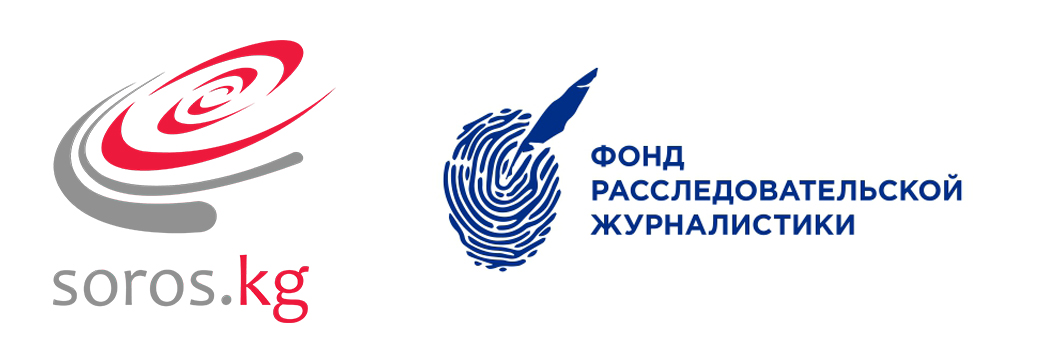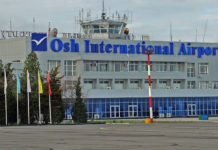
The halls of the Ayar Bala Disabled Children’s Rehabilitation Center in the city of Osh are full of children waiting for procedures. Some of the children sit in wheelchairs; others try to move with the help of walkers and crutches.
In one office, a doctor examines a boy and talks with his mother. Other patients wait their turn in the very same room.
Among them is Venera, who has been bringing her daughter Sezim to this rehabilitation center for five years. Sezim is ten years old and has cerebral palsy.

“The treatments will probably continue all her life, I’m not sure. She’s ten now, but she has never stood on her legs. She can’t walk. Progress is slow. The doctors said, ‘Don’t interrupt the treatments, then there will be progress.’ We can’t stop the treatments, or she’ll get worse,” says Venera.
Venera is raising two children as a single mother. Her oldest son has already finished ninth grade. They rent a room in a dormitory for families in the microdistrict Manas-Ata (formerly HBK). Her ex-husband, she says, lives in Moscow; she hasn’t heard from him in two years.
Nearby, a man named Bakhtiyar carefully settles his son, Arzybek, on a puffer coat and wipes sweat from his brow. Eleven-year-old Arzybek also suffers from cerebral palsy and cannot even sit without help. The father and son arrived at the rehabilitation center from Chet-Bulak, a village in the municipality of Batken. For Bakhtiyar, ‘Ayar Bala’ is the nearest medical center capable of treating his son, even though the drive from Batken to Osh takes a minimum of five hours.

“We’ve come here before. They do massages, physiotherapy. I took my son to Bishkek, but they sent me here. Ak-Suu* is too far away for us, so we came here […] In Ak-Suu they do hydrotherapy, the water there flows from under the mountains,” says Bakhtiyar.
* Ak-Suu, also known as Teplokluchenka, is a village in Issyk-Kul Region that is home to a sanatorium for the rehabilitation of children with cerebral palsy. In the hot springs of Ak-Suu, children with disabilities receive hydrotherapy to support their immune systems.
Venera and Bakhtiyar are among the many parents who have to stay with their children in the Ayar Bala rehabilitation center. It used to be that patients could stay and receive treatment for an entire month. Now, however, they may stay only ten days. Demand for the center’s 70 beds is always over capacity, a problem that has only gotten worse with time.
According to the center’s director, Zarifa Akmatova, patients often wait three months for a bed. In addition to cerebral palsy, the center treats children with scoliosis and clubfoot, which Akmatova describes as equally serious conditions.
“Our center is in Osh, but our patients come from three southern regions: Batken, Osh, and Jalal-Abad. They are mostly children with cerebral palsy. If we have seventy children, at least sixty of them have cerebral palsy,” said Akmatova.
Out of space — and selling land?

The rehabilitation center’s gray and unremarkable building was built in 1955. At the time, it served as the city’s maternity hospital. In 2001, it passed into the management of the mayor’s office and was redesignated as the Disabled Children’s Rehabilitation Center.
It is clear that the rehabilitation center is too small and should be expanded with new buildings and more staff. Such a move would benefit children with cerebral palsy not only from Osh, but also neighboring regions. However, the mayoralty of Osh disagrees.
Between 2003 and 2007, the city –under the leadership of former mayors Satybaldy Chyrmashev and Zhumadyl Isakov – directly or via auction sold approximately five thousand square meters of land belonging to the center. As a result, the territory belonging to Ayar Bala was reduced by a third while the new owners of the land began construction around the center’s main corpus.

The rehabilitation center is located in Osh’s city center, where land was and is at a premium. However, the former city heads sold the land in defiance of a government order outlawing the privatization of social infrastructure.
Because of this, local authorities and the public prosecutor’s office have spent years suing for the return of the sold and auctioned property. Let’s start from the top.
A sauna for Osh City Hospital’s chief of medicine



These ruins were once the rehabilitation center’s sauna. According to Zarifa Akmatova, the building also housed a pool for hydrotherapy.
In November 2003, the mayor’s office sold the sauna to Kanatbek Akmatov, who was then the director of Osh City Hospital. A year later, Akmatov became the legal owner of 707 square meters surrounding the sauna. Another 36 square meters were handed over under a fifteen-year lease.
Akmatov’s lot was later increased to 1491 square meters and changed hands several times. In 2013, it was purchased by a construction company, Comfort Plus.
In 2017, Osh’s city attorney succeeded in winning a legal acknowledgement that the mayoralty had acted illegally in selling the land. However, Comfort Plus retains the property’s title to this day, as previous owners had managed to arrange a government act confirming their right to private ownership of the land. To annul the act will require another win in court.
The mayor’s office told Kloop that the municipal property management department was preparing documents to start the legal process. As for how long it will take to secure the property’s return — no one can say.
The Matraimovs’ business partner



The lot next to the ruined sauna, where a six-story building is now being erected, was sold to a subsidiary of EkoBank (now EkoIslamikBank) in June 2004. The lot measures 547 square meters.
Since then, the land has changed hands several times. In January 2020, it was purchased by Azamat Arstanbaev. Within a month, he sold it to the construction company Vavilon Group with an agreement to develop it together.
Azamat Arstanbaev is well-acquainted with the Matraimov family, who are influential in the south. Azamat himself is the former business partner of Ruslan and Chynary Matraimov. His brother, Almazbek Arstanbaev, is the ‘okul bala’ (a kind of adopted son) of Rayimbek Matraimov, former deputy director of the State Customs Service. Since 2016, their sister Glushat Arstanbaeva has rented a cafe, ‘Buddha Bar’, which media sources link to the Matraimov family.
Azamat Arstanbaev also bought a neighboring lot which once housed the Doctor Kamaldin Aydarov Medical Center. Now it is being developed as a parking lot for an office building. However, city records indicate that this lot never belonged to the rehabilitation center.
Surprisingly, Arstanbaev’s acquisitions have gone unchallenged in court.


Ashiraba Maripova, owner of a neighboring plot and formerly a gynecologist at the maternity hospital, has not been so lucky. She also bought land and a building (the Doctor Maripova Medical Center) from the city in 2007, but in 2016, the Osh District Court declared the city’s actions illegitimate. Now local authorities plan to once again go to court, this time to reclaim the property.
The director of Ayar Bala

With the arrival of a new mayor, Zhumadyl Isakov, Ayar Bala’s territory continued to shrink. In 2006-2007, the mayor’s office divided the land in front of the center into eight parts and sold them to private individuals via auction. The lots were intended to be developed into two-story commercial spaces and offices.
Some of the new owners were able to put up buildings. For example, one of the parcels houses the two-story office of the construction company Emakom*, which bought the building in 2019. The city attorney’s office tried to secure the land’s return, but the court dismissed the case without explanation. Other buyers succeeded only in pouring foundations. The owners of the third lot abandoned their land entirely.
* Emakom is the same construction company that illegally erected a seven-story apartment complex in the Sulaiman-Too buffer zone. The construction posed a threat to the mountain’s designation as a UNESCO World Heritage Site.
Also up for auction was a grocery store, ‘Nariste’, located next to the Emakom office. The shop was built in 1975 right at the entrance of the medical center and was considered part of the city maternity hospital.


Ayar Bala’s then-director, Sayrakul Kyshtobaeva, seized the opportunity. She bought the grocery shop in January 2007, having offered the highest bid: 160,500 som.
Kyshtobaeva revamped Nariste as a cafeteria, in which form it remained open until the end of 2020. In the same small building, there was a translation company, ‘Sleng-Osh’, and a fast food joint.
In July 2014, the Osh city attorney’s office determined that the shop had been sold illegally and sued. Not until four years later, in 2018, did the courts — first Osh City Court, then the civil law panel of the Osh Regional Court — rule in their favor. The actions of the mayor’s office and the sale of the land were declared invalid. In November of the same year, the Supreme Court put an end to the matter, leaving the decision of the lower courts in place.
By that time, the value of the land and the cafeteria had risen to 2.614 million som.
The mayor’s office returned Nariste to its portfolio. However, in February 2021, the cafeteria’s premises were reopened as a bridal salon, ‘ZhazEl’. City authorities were unable to explain why municipal property is still being used by private citizens. ZhazEl is not listed among the city properties currently under lease.
Kyshtobaeva led the rehabilitation center until 2009. Kloop was unable to reach her for comment.
No one benefits


From the beginning, the journalists of Kloop were interested in this three-story building, which has been vacant for more than 10 years. The land under it once was home to Ayar Bala’s cafeteria, but the new owner of the lot razed it and began construction of a new building.
* Thanks to our decision to capture video footage of this building, we had the pleasure of dealing with Osh’s branch of the Interior Ministry. All because Ruslan Matraimov complained to the police about our journalists — he thought we were shooting video of his home.
According to records from the Department of Municipal Property, the 942-square-meter lot, along with the cafeteria, was sold via auction in March 2007 to Kubanychbek Ormonov, the deputy director of the Kyrgyzdortransproyekt Institute, part of the Transportation Ministry.
In November 2014, the Osh Region Inter-District Court pronounced the sale illegal, and on February 13, 2015, the land was returned to the mayor’s office. Not until four years later did the Department of Municipal Property send Ormonov a letter demanding that he take down the building.
Both sides filed lawsuits: the mayoralty is seeking the demolition of the illegal building, while Ormonov demands the return of the money he paid for the lot.
It seems that the mayoralty of Osh wants to take down an illegally-constructed building, as is required by law. However, this raises a question: would it not be better to add the building to the mayoralty’s portfolio? Ormonov’s building is nearly complete, requiring only external and internal finishing.
The building could have helped city authorities cope with last year’s ‘Black July’, when hospitals ran out of places for people sick with Covid-19. The pandemic forced the government to rush the construction of new hospitals.
In Osh, a new 100-bed hospital was built for 107 million som. It was finished eight months late, during the country’s second coronavirus wave.
For comparison, authorities in Suzak District worked together with residents to repurpose an abandoned dormitory as a Covid-19 hospital in only two months. The new hospital in Suzak boasts 304 beds and cost only 15 million som.
If demand for beds for Covid-19 patients falls, the three-story building could be used as an additional corpus for Ayar Bala Rehabilitation Center. There, more space is always needed.
No one has been held responsible
Osh’s public prosecutor’s office began verifying the legality of the Ayar Bala land sales at the direction of Kyrgyzstan’s Supreme Council, the Jogorku Kenesh, in 2014. Once violations had been identified, the mayoralty of Osh acknowledged that the land was sold illegally. Since then, the mayoralty has supported the public prosecutor’s office in court.
But despite the public prosecutor’s success in reclaiming some of the lots, in practice, Ayar Bala’s territory remains as it was in 2007. The mayoralty is in no hurry to return the land to the rehabilitation center’s control.
The mayoralty’s indifference to the center is also shown by its 2013 encroachment into Ayar Bala’s own building. City authorities decided to rent out seven rooms on the center’s second floor. The rooms rented for 11,000 som per month.
Because of the severe shortage of beds, staff members were forced to vacate their offices. The rooms were only returned in 2019 after a court order.
The mayoralty’s most visible show of support for Ayar Bala takes place on June 1, International Children’s Day. On that day, a handful of officials from the mayor’s office typically come to the center, participate in celebratory events and give gifts to the children. The mayor’s office also offers the center material aid.
The Osh Center for the Rehabilitation of Children with Cerebral Palsy held an event to celebrate International Children’s Day.
On June 1, the Osh City Center for the Rehabilitation of Children with Disabilities held celebratory events to mark International Children’s Day. Vice-Mayor of Osh Zamir Yusupov wished the children a happy holiday and noted the high importance of the Center’s work.
During the event, the center was given material aid, and all children received presents.
A small concert program was also organized.]
Was even a single official held responsible for the mayoralty’s illegal actions and the loss of the center’s property? No. In 2014, the public prosecutor’s office opened a criminal case against the responsible parties, charging abuse of official powers and violation of land use law. However, the case was closed, as the statute of limitations had expired.
It remains unknown whether either of the ex-mayors were suspects in the case, as our questions to the Prosecutor General’s office did not receive a clear response. However, media sources report that Chyrmashev and Isakov have each been accused of crimes: Chyrmashev was charged with embezzling 5 million som as head of the Emergency Situations Ministry, while Isakov was accused of corrupt behavior concerning the sale of land. Isakov, we should note, was later acquitted for lack of evidence.
We were able to contact ex-mayor Chyrmashev through social media, but he stopped responding after learning that we were journalists with Kloop. We were unable to contact Zhumadyl Isakov.
While we prepared our report, Venera and her daughter returned to their room in the dormitory. She must now wait three months before her daughter can return to the center to continue her treatment.
“It takes time and patience. So we are patient. I have never left Osh, like everyone I wish I could take [my daughter] to rehabilitation centers in Ak-Suu, Jalal-Abad. But when it’s my turn, I don’t have the money, and when I have the money, I have to wait.”
Venera says she cannot work, since her daughter Sezim requires special care and there is no one she can leave her with. She lives on benefits. If she had enough money she would visit rehabilitation centers in Jalal-Abad or Issyk-Kul, but for now she has only enough for rent, food, and medicine.

This material was created for “Developing and strengthening the potential of regional investigative journalism”, a project of the Investigative Journalism Fund with support from the Soros-Kyrgyzstan Fund.
This material can be freely copied, adapted and distributed in any format and for any purpose, including commercial, as long as the author receives credit.
The contents of this report are the responsibility of Kloop Media and do not represent the views of the Investigative Journalism Fund or the Soros-Kyrgyzstan Fund.
Translated by Hallie Sala from Respond Crisis Translation





